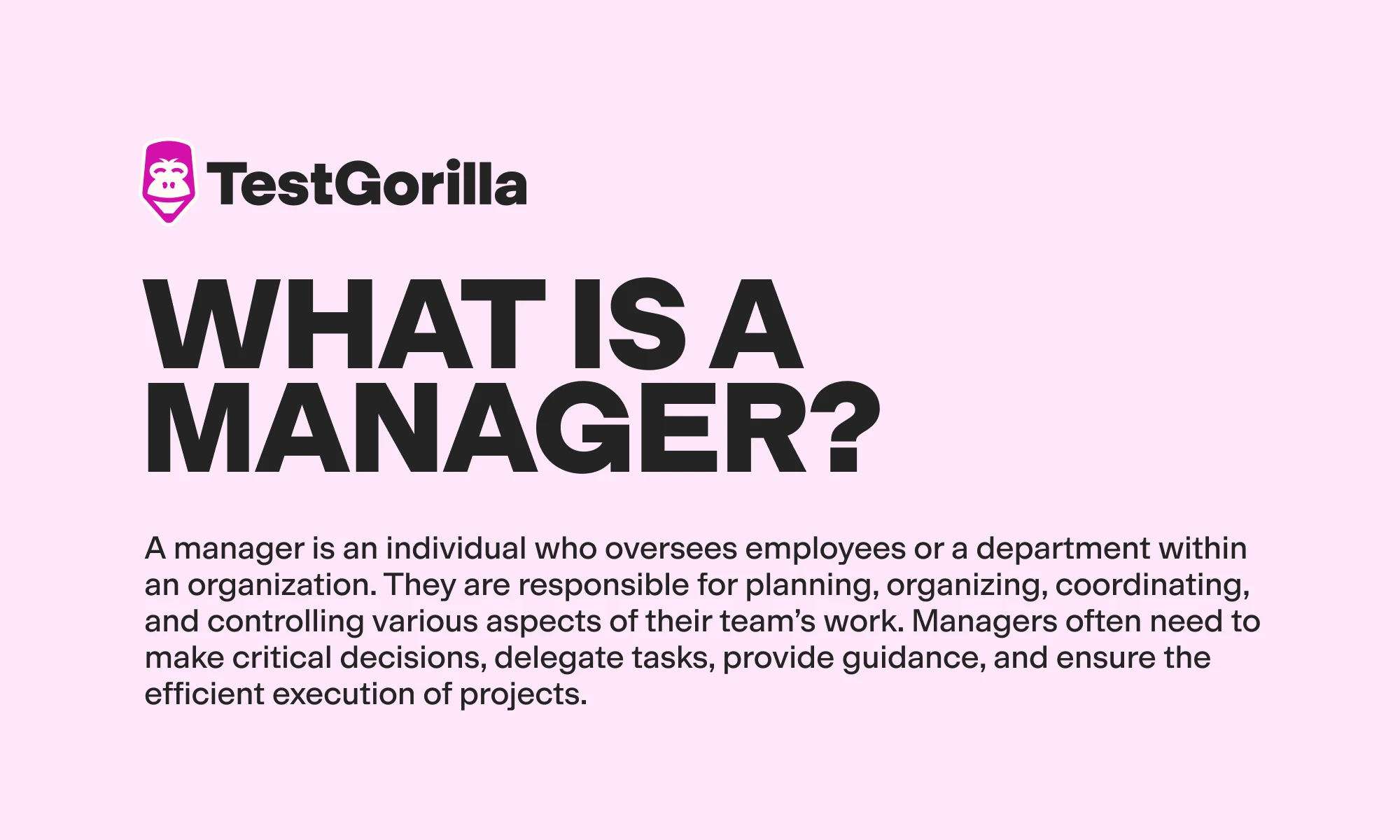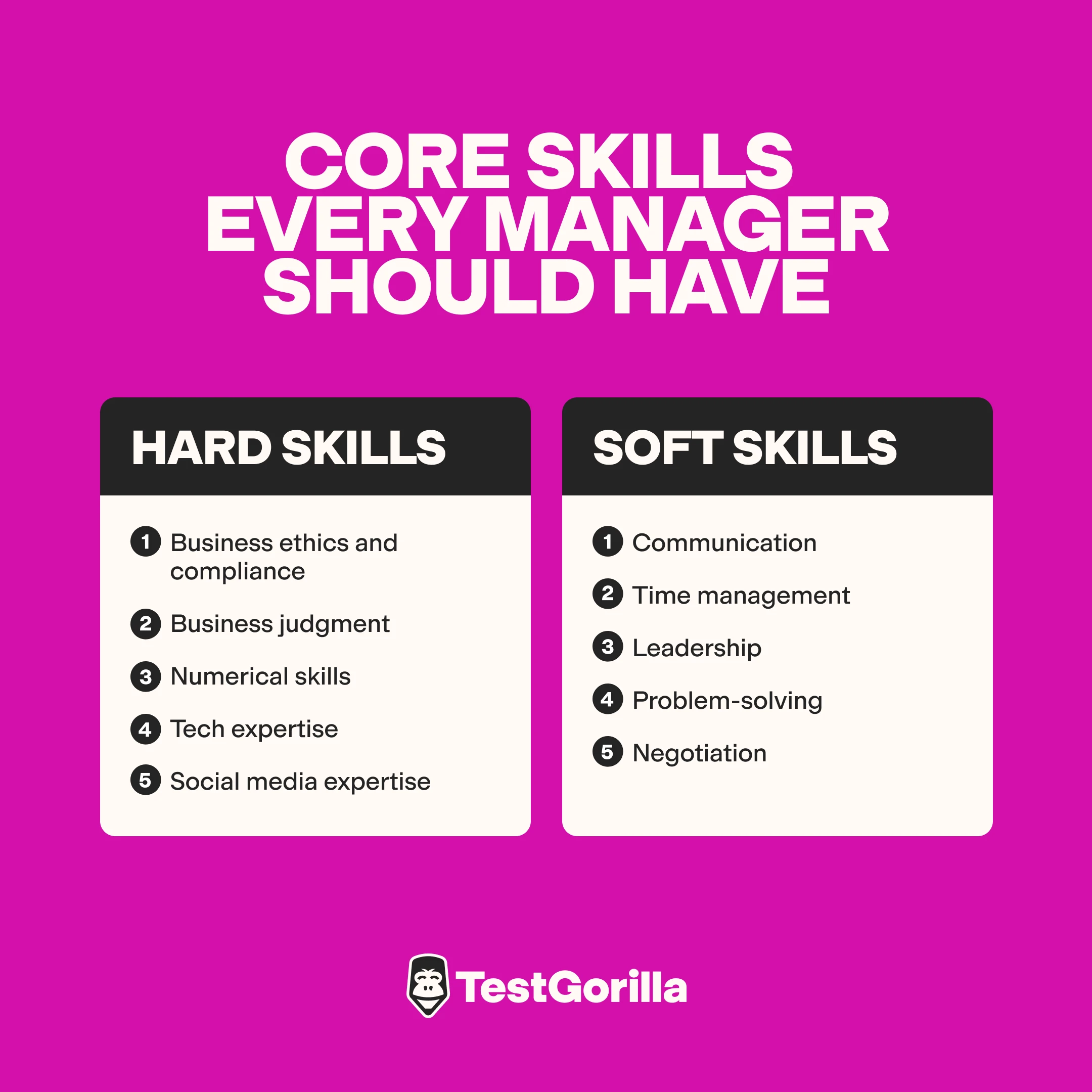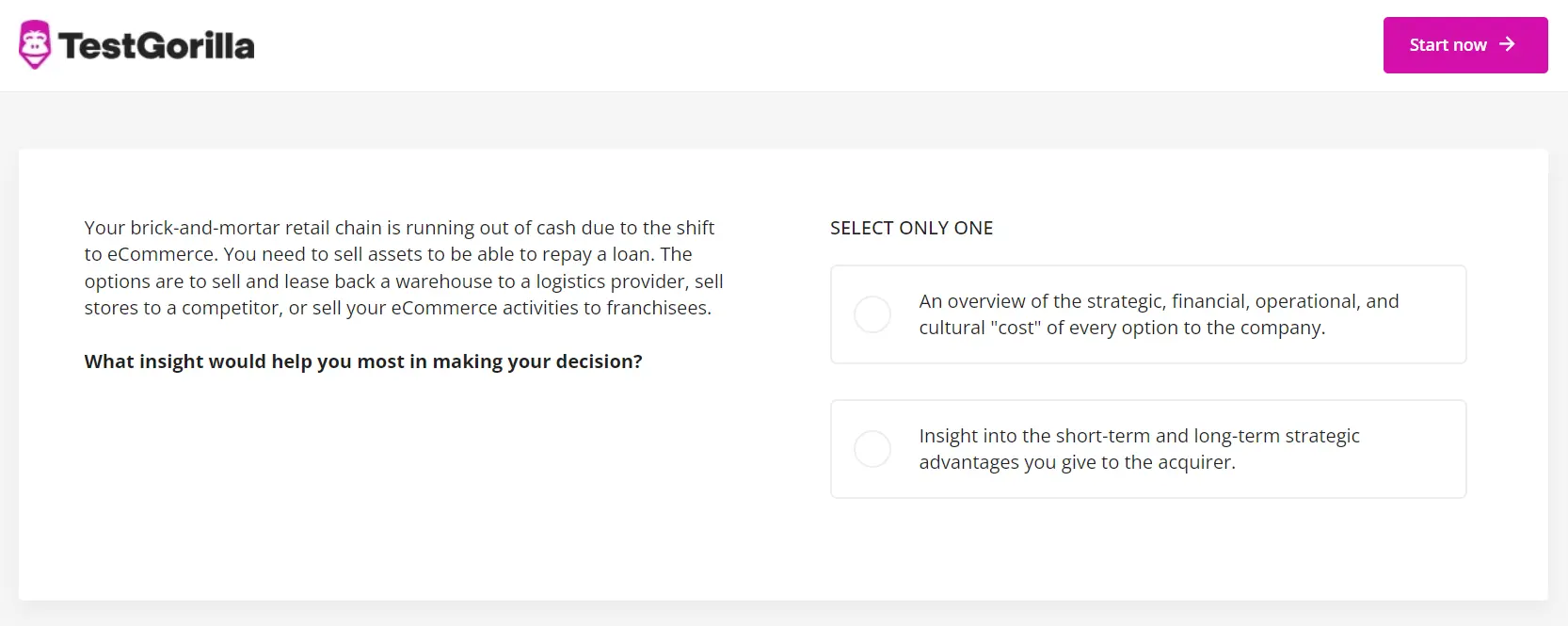How to hire a manager in 4 steps: Discover key skills using talent assessments
Looking for an easy and objective way to hire a manager?
The market is saturated with managers who don’t possess the essential hard and soft skills to lead effectively. Hiring the wrong candidate can disrupt your team’s morale, impact productivity, and prevent you from reaching your business goals.
That’s why it’s vital to learn how to hire a manager who can contribute to your company’s success.
In this article, we explore how to find a manager with the right skills using talent assessments, explain the difference between good and bad managers, and discuss how much you can expect to pay for a manager’s salary.
What is a manager?
A manager is an individual who oversees employees or a department within an organization. They are responsible for planning, organizing, coordinating, and controlling various aspects of their team’s work. Managers often need to make critical decisions, delegate tasks, provide guidance, and ensure the efficient execution of projects.
Their main responsibilities include:
Providing guidance, direction, and support to their team
Setting goals, communicating expectations, and motivating employees
Determining the long-term goals and objectives of their department or team
Developing plans, establishing timelines, and allocating resources to complete a project in time
Structuring and organizing work activities, tasks, and resources to achieve desired outcomes
Analyzing information and choosing the best course of action to address challenges and solve problems
Communicating with executives and team members
Evaluating employee performance, providing feedback, and identifying opportunities for growth and development
If you hire business managers who are not a good fit, it can cost you billions of dollars per year. Surprisingly, 82% of companies fail to hire the right manager, which ends up costing them more than they gain.
Types of managers: How to hire a manager who fits your company
Organizations often have a hierarchical structure with various levels of management, which include senior, mid-, and low-level managers.
Each level of management has its own set of responsibilities and functions.
Manager seniority level | What they do |
Senior managers | Responsible for making strategic decisions that shape the overall direction of the company Set long-term goals, establish policies and procedures, and allocate resources to achieve organizational objectives |
Middle managers | Oversee specific departments, such as finance, marketing, operations, or human resources Coordinate the efforts of their teams, ensure effective communication, and monitor performance |
Lower managers | Oversee the work of front-line employees Ensure tasks are completed efficiently and according to standard operating procedures |
Now that you understand the various management levels, we can explore some of the most common types of managers you can hire.
Although this is not an exhaustive list, it helps you take note of different types of managers and their responsibilities.
Different types of managers you can hire | What they do |
Marketing manager | A marketing manager is responsible for marketing a product, business, or service. They develop marketing strategies to promote new products and drive customers toward making a purchase. |
IT manager
| An IT manager oversees all computer-related operations of an organization. They ensure all systems work properly, are in charge of building a solid and functional website, and are responsible for the safety of your systems and customer data. |
Account manager
| An account manager is in charge of maintaining good customer relations, responding to queries, nurturing business relations with customers, and retaining them long term. |
Logistics manager
| A logistics manager needs top organizational skills to move products from one place to another in a timely fashion to meet deadlines. They are also responsible for the supply chain and are a key factor in having an efficient business model. |
Sales manager
| A sales manager drives sales, finds new clients, and closes deals. They manage client communication and train the sales team to generate as much revenue for your company as possible. |
Operations manager
| An operations manager ensures the day-to-day functions of your organization run smoothly. They manage and enhance work processes, increase productivity and profits, and help teams work together. |
Why hire a manager?
Hiring a manager is an obvious solution when you need someone to oversee your business operations.
Most employers decide to hire managers when experiencing a boom in business. Whether you’re opening more venues or departments or have too many personnel that need managing, a manager can take charge while you focus on the big picture.
As your small business grows, so does the workload. If you and your team struggle to keep up with the increasing business needs, it is a clear sign that it’s time to hire a new manager.
A manager distributes responsibilities and relieves your team of excessive workloads. That enables employees to focus on their core responsibilities, improving engagement and performance. In fact, employees are 3.4 times more engaged when they feel trusted and supported by their manager.
As a business owner, your time and energy are valuable resources. With a capable manager, you can dedicate more attention to long-term planning, business development, and other high-level activities that contribute to the growth and success of your business.
Use TestGorilla to hire better managers
Hiring managers requires a more comprehensive evaluation of technical proficiencies, soft skills, and leadership abilities. Sign up today to discover firsthand how our talent assessments can help you identify managers with the highest potential.
The best insights on HR and recruitment, delivered to your inbox.
Biweekly updates. No spam. Unsubscribe any time.
10 fundamental skills that managers need
Now that you understand why hiring a manager is important, let’s discuss how to find a manager with the right skill set. Below, you’ll learn about the most important hard and soft skills you need to evaluate to identify the ideal candidates for the manager position.
Manager hard skills
Here are the most important manager hard skills:
Manager hard skills | Importance |
Business ethics and compliance
| Protecting integrity and legal compliance within the organization, maintaining trust with stakeholders, and mitigating risks of unethical behavior and legal violations |
Business judgment
| Making informed decisions that drive organizational success, including strategic planning, resource allocation, and risk management |
Numerical skills
| interpreting financial data, analyzing performance metrics, and making data-driven decisions to drive business growth and profitability |
Tech expertise
| Using various software and platforms essential for business operations to streamline operations, enhance productivity, and stay competitive |
Social media expertise
| Developing and executing effective social media strategies to enhance brand awareness, engage customers, and drive revenue growth |
Manager soft skills
Look for these manager soft skills when assessing your candidates:
Manager soft skills | Importance |
Communication | Improving collaboration, ensuring clarity in instructions and feedback, and building positive relationships with team members, clients, and stakeholders |
Time management | Prioritizing tasks, meeting deadlines, and optimizing resource use to enable efficient workflow management and productivity |
Leadership | Inspiring and motivating team members, providing guidance and direction to direct reports, and maintaining a positive work and company culture |
Problem-solving | Identifying and addressing challenges, making informed decisions, and finding innovative solutions to drive continuous growth |
Negotiation | Resolving conflicts, reaching agreements, and achieving favorable outcomes in negotiations with clients, suppliers, and stakeholders |
Looking for a way to assess managerial hard and soft skills?
Use our talent assessments to measure hard and soft skills of potential candidates and identify those with the right competencies. Book a demo to learn more.
The difference: Good managers vs. bad managers
Imagine a team meeting with a great manager. As team members discuss project updates and challenges, the manager actively listens to everyone’s input, encouraging open communication and collaboration.
When a team member expresses concerns about meeting a deadline due to unforeseen obstacles, the manager steps in with a clear plan. They offer guidance and support to overcome the hurdles. This ability to address the issue promptly and find solutions boosts team morale and creates a sense of trust and shared goals.
In contrast, meetings with a bad manager are usually unproductive. The communication is flawed, the expectations are unclear, and there’s little room for team members to voice their concerns.
When challenges arise, the manager brushes them off, failing to provide guidance or support. As a result, team members feel unsupported and disengaged, leading to decreased productivity and morale.
Let’s examine how to get a manager who can create and maintain a positive and productive team environment.
4 steps on how to hire a manager
It’s crucial to create the right strategy to ensure you hire managers who effectively lead and inspire your team. These four steps can help you find a manager with the right skills and qualities to help your organization succeed.
1. Write a compelling job description
You only have a few seconds to capture a potential manager candidate’s attention, so you want a job description that is clear, concise, and easy to read.
Here’s a manager job description template you can use to attract qualified candidates:
Job title: [X] manager
Job summary: We’re looking to hire a [x] manager to lead our [x] team and be in charge of planning and executing strategies within the organization. This includes coordinating and optimizing processes, ensuring efficient resource allocation, and managing customer relations.
Main responsibilities:
Lead and manage the [x] team, providing training, guidance, and feedback
Coordinate and oversee day-to-day operations
Monitor and analyze performance metrics
Identify areas for improvement and implement necessary changes
Work closely with other departments and managers
Ensure quality control
Qualifications:
Knowledge of operational procedures
Exceptional verbal and written communication
Excellent leadership and people skills
Creative thinking and problem-solving skills
Salary: [Mention the salary range]
Benefits: [List all the benefits]
2. Use skills assessments to hire the best talent
Although job seekers can inflate their resumes with skills and management experience, TestGorilla’s talent assessments weed out unqualified candidates, leaving you with top professionals only.
Skills testing helps you avoid bad hires and remove biases from your recruitment process. In fact, 92% of employers think hiring based on skills is the best way to identify top talent.
For example, Pilgrims’ Friend Society, a UK-based elderly care company, struggled to identify high-caliber candidates. The organization used TestGorilla’s skills assessments to streamline recruitment and identify suitable candidates for senior managerial roles.
Using our skills tests significantly improved candidate quality, leading to better hires and enhanced team performance.
Keep in mind that there are many types of managers, so your hiring approach should be based on the specific position.
For example, a marketing manager needs role-specific skills in social media marketing, while an operations manager requires a different skill set that includes numerical reasoning. However, both roles require consistent communication, leadership, and problem-solving skills.
Here are five universal skills tests you can use for a manager’s position:
Business Judgment test: Evaluate candidates’ abilities to strategize and innovate, improve company performance, and know their way around sales and marketing
Business Ethics and Compliance test: Identify candidates with excellent business ethics and understand how their role and behavior can impact internal and external company situations and relationships
Communication Skills test: Assess someone’s ability to listen and understand written and verbal communication, communicate effectively, and use professional etiquette
Leadership and People Management test: See how well your candidates can delegate authority, provide guidance and feedback to employees, and plan ahead
Problem Solving test: Screen applicants based on their abilities to prioritize urgent and important tasks, analyze information, and interpret data to reach the best outcomes
Sign up for a Free forever plan to start using our talent assessments in your hiring process.
3. Choose the best manager hiring channel
When it comes to manager recruitment, there’s no better place to look than within your own company. In fact, it boosts retention: Employees are 70% more likely to stay with your organization when you promote them.
Employees already working for you know the ins and outs of your company, especially if they have years of experience there. They can follow standard operating procedures and are familiar with the other departments and senior management.
When you hire people internally, the initial onboarding period is shorter because existing employees know how each team works. They can jump in and start performing right away.
If you want to hire externally, you need to provide training and allocate extra resources for the new employee’s salary, bonuses, and benefits.
You can advertise an open position on your website and social media channels. Don’t forget to ask for referrals from industry colleagues and current employees, tapping into the professional networks of the people you trust.
If you have several one-off projects that need managing, you can opt for a part-time or freelance manager. The great thing about part-time managers is that you don’t need to train them and spend extra resources on benefits or bonuses.
You can look for part-time managers on websites such as Upwork and Glassdoor.
4. Ask the right interview questions
An interview helps you understand how your candidates react to specific situations, manage their team, and approach the role of being a manager.
We’ve compiled several interview questions to help you decide which candidate is best suited for the job:
How would you lead a team through a challenging project with tight deadlines? How would you handle any obstacles or setbacks?
How do you prioritize and delegate tasks to ensure effective time management and optimal usage of resources?
You need to make a difficult decision that affects your team. How do you approach the decision-making process, what factors do you consider, and how do you communicate and implement that decision effectively?
How would you approach a challenging communication situation, such as delivering negative feedback to a team member or handling a conflict within your team?
Can you share an example of how you would motivate and support your team members in reaching their full potential?
These interview questions for supervisors and managers can help assess a candidate’s leadership, decision-making, time-management, and communication capabilities, as well as their approach to employee development and performance management.
Use TestGorilla to optimize your hiring process
Use our skills tests and only invite the best candidates with proven skills to the interview stage. Reduce your time to hire, cut hiring costs, and improve your future talent retention efforts.
How much does it cost to hire a manager?
The national median manager salary in the United States is $109,000 per year. Of course, you need to consider location and the type of manager to get an accurate estimate.
Don’t forget to factor in whether you want to hire a full-time or part-time manager, which also affects how much you need to pay them.
Hire the best managers with TestGorilla
Effective managers need to have various skills, including stellar communication, problem-solving, negotiation skills, leadership qualities, and the ability to make sound judgments.
With TestGorilla’s skills assessments, you can easily evaluate these skills and find the perfect candidate for your business.
Don’t wait for the competition to scoop up the most qualified managers, leaving you with mediocre talent. Sign up for a Free forever plan to start using our skills tests today.
Or alternatively, contact one of our representatives for a free live demo to learn how to hire a manager the right way.
How to hire a manager FAQs
Still trying to figure out how to find a manager who can help your business grow? Find the answers below.
How do I hire a good manager?
Outline the manager’s responsibilities and expectations
Create a compelling job description and mention essential skills
Consider whether some of your current employees could be a good fit for the management role
Put job postings on job boards, social media, and professional networks like LinkedIn
Use talent assessments to evaluate skills
Use a structured interview process to learn more about the candidates
What to look for when hiring managers?
When hiring managers, look for candidates with strong leadership skills, excellent communication abilities, and a motivation to excel in the role. Assess their ability to delegate tasks effectively, handle conflicts, and motivate teams. In addition, prioritize candidates who show adaptability, problem-solving capabilities, and a commitment to continuous learning and development.
How to spot a bad manager?
Poor communication: They struggle to articulate expectations or provide constructive feedback
Micromanagement: They excessively monitor and control employees’ work, affecting their autonomy and creativity
Lack of accountability: They blame others for failures or refuse to take responsibility for mistakes
Lack of recognition: They don’t recognize the hard work or achievements of their team members
Inability to delegate: They hoard tasks, which leads to inefficient team performance
How is hiring a manager different than hiring employees?
Hiring a manager differs from hiring employees because it requires a focus on leadership and broader skill sets. If you’re examining how to hire a manager, you need to assess their leadership potential, soft skills, and cultural add. These competencies are vital for building and motivating teams, resolving conflicts, and maintaining a positive work environment. On the other hand, employee hiring focuses more on technical qualifications.
You've scrolled this far
Why not try TestGorilla for free, and see what happens when you put skills first.





















